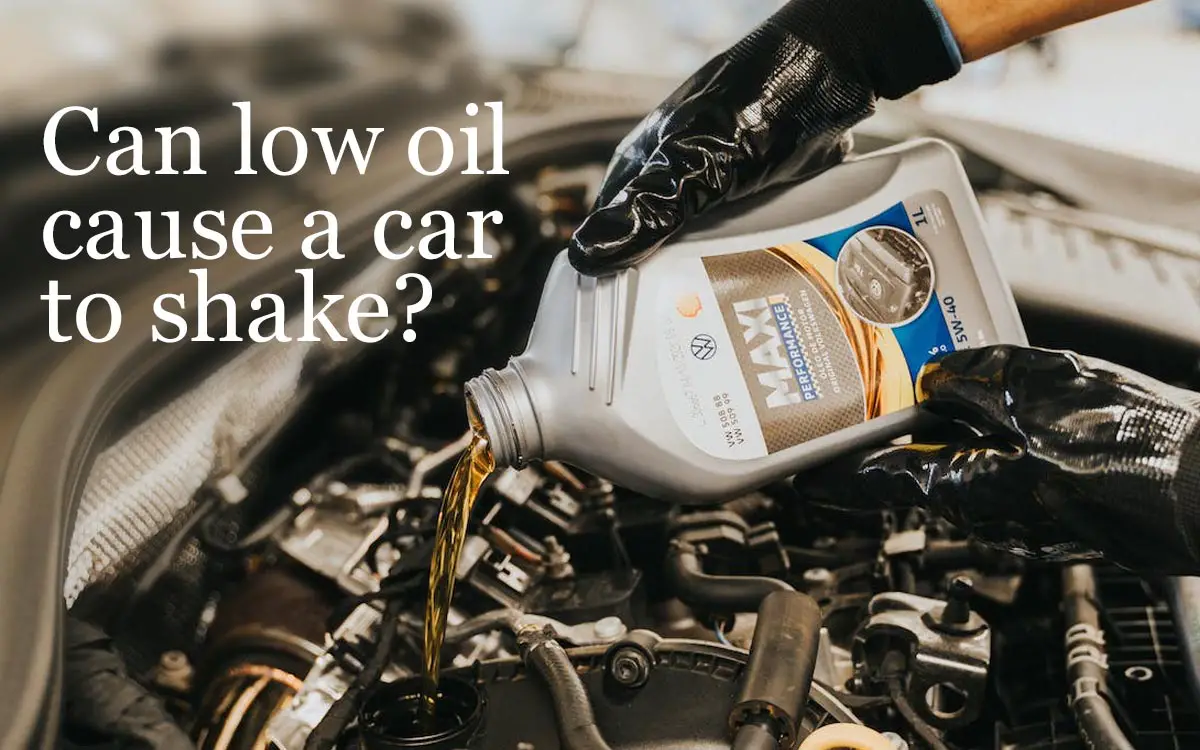Have you ever felt that terrifying moment when your engine starts to shake? It’s like a wild ride on a roller coaster but without the exhilaration. Well, hold your horses because we’re about to spill the oil on the truth behind the engine shaking.
In this article, we will uncover the alarming warning signs of low oil and how this sneaky culprit can turn your smooth ride into a shaky nightmare. So buckle up and get ready to learn why low oil is the engine’s sworn enemy.
To answer the question of the day “Does low oil cause your car’s engine to shake?” the answer is a definitive yes. Low oil levels can be the reason your engine starts to shudder and vibrate.
In most cases, this will occur at idle or when you’re driving around town on low RPMs. When there’s not enough oil in the system, the engine has to work harder than usual which increases friction and accelerates wear and tear. This results in engine shakes and can turn your commute into a wild ride.
So what are the warning signs of low oil? Well, there are two tell-tale signs that you should look out for:
- A drop in engine performance
- An illuminated oil pressure light on your dashboard
Let’s explore all of these signs in more detail:
1. A drop in Engines Performance
Usually, a drop in engine performance is the most obvious sign that your oil levels have gone too low. You’ll feel less power when you step on the accelerator and no matter how hard you try, your engine will struggle to reach its usual horsepower. This is because low oil causes excessive friction between moving parts which makes it harder for the engine to do its job efficiently.
It can be a bit annoying if you’re trying to get up a hill or accelerate quickly, but this is one of the best ways to detect low oil levels.
2. An Illuminated Oil Pressure Light
On the dashboard of your car, there is an oil pressure light that lights up when your oil levels are too low. This will be triggered by sensors in the engine monitoring system and it’s usually displayed as a bright yellow or red warning light.
When this light comes on, you should stop driving your car and check the oil levels immediately. If it is low, then you need to top it up with fresh oil before driving any further.
What to do if your Engine Oil Runs Low
1. Engine Oil Check
If you are experiencing engine shakes or the oil pressure light comes on, you should immediately check your engine oil levels. This can be done in a few simple steps:
- Park the car securely on a flat surface and make sure it is turned off.
- Lift the hood of the car and find the dipstick (it will usually have a bright yellow handle)
- Pull it out and wipe it off with a clean, dry cloth or paper towel.
- Put the dipstick back in, wait a few seconds, then pull it out again to check for oil levels.
- If the oil level is below the minimum mark on the dipstick (usually indicated by an ‘L’) then you need to top it up.
2. Refilling Your Engine Oil
Once you have determined that the oil level is below the minimum mark on the dipstick, you can then proceed to top it up. You should find the engine oil reference guide in the owner’s manual of your car and purchase the correct type for your vehicle.
Before pouring the oil into the engine, make sure that there are no leaks or cracks in the container you are using, and also check the expiration date on the container. If everything is in order, unscrew the cap of the engine oil tank and pour in the oil until it reaches the full mark on the dipstick.
Once you have topped up your engine oil, start the car to make sure that everything is working properly. If you still feel a shake or noise coming from your engine, it is best to take your car to a professional mechanic for further diagnosis.
Running low on engine oil is a common problem that can be quickly checked and refilled by following the steps outlined in this article. However, if you are still experiencing any issues with your car, it is best to consult a professional mechanic who will be able to accurately diagnose the problem.
Keep reading to find out about other causes of engine vibration.
What are the other causes of engine vibration
There can be several other causes of engine vibration, including:
- Worn out spark plugs.
- Worn out engine mounts.
- Out-of-balance tires and wheels.
- Loose suspension components.
- Malfunctioning Transmissions.
- Damaged exhaust system components.
Let’s explore all of these in detail:
1. Worn Spark Plugs
When spark plugs are worn out, they can cause your engine to misfire and vibrate. This is because the spark plugs are responsible for igniting the air-fuel mixture inside the cylinders. If the mixtures aren’t firing properly due to faulty spark plugs, it can cause your engine to shake.
Spark plugs are usually changed every 30,000 miles or so but if you are unsure of when your car’s last spark plug replacement was, consider taking it to a professional mechanic for a check-up.
2. Worn Out Engine Mounts
Engine mounts secure the engine to the frame of your car and may become loose over time. You must make sure your engine mounts are tight, as loose engine mounts can create vibrations throughout the car. You would normally experience this vibration while accelerating or braking.
To check for loose engine mounts, you can carefully drive around a parking lot and listen for any strange noises that may indicate a worn-out engine mount. If you’re unsure about checking the condition of your engine mounts, consult a professional mechanic as they will have the right tools and experience to identify any issues with them.
3. Out-of-Balance Tires and Wheels
Tires that have worn down on one side more than the other (known as an out-of-balance tire) can cause a significant amount of vibration in your car’s cabin. This is because the tires are not being evenly supported by the road. This type of vibration will usually be more noticeable at higher speeds.
You can easily check for out-of-balance tires and wheels by using a mechanic’s balancer or having a professional take care of it for you. If your car has an out-of-balance tire, consider having it rotated or replaced to reduce the vibrations.
4. Loose Suspension Components
Another possible cause of engine vibration could be loose suspension components. The shocks, struts, and other suspension components of your vehicle can wear down over time. These components are responsible for keeping your car’s body stable and vibrate-free when driving on uneven or bumpy roads. If any of these parts are worn out or loose, it can cause the entire body of the vehicle to vibrate. I remember the time when my car had loose suspension components, and I could feel every bump on the road.
To check for loose suspension components, you should inspect them visually and look for any signs of wear or damage. If anything looks off then it’s best to get it checked out by a professional mechanic as soon as possible.
5. Malfunctioning Transmission
A malfunctioning transmission can also cause your engine to shake and vibrate excessively. You will usually experience the shaking in combination with a grinding noise coming from the transmission, as well as slipping gears and difficulty shifting.
If you notice any of these symptoms, take your car to a professional mechanic as soon as possible. The transmission may need to be serviced or rebuilt, depending on the extent of the damage.
6. Damaged exhaust system components
A damaged exhaust system can also cause engine vibration and shaking. Exhaust components such as the muffler, catalytic converter, and resonator are responsible for filtering exhaust gases from your car’s engine. If any of these parts become clogged or otherwise damaged, it can result in vibrations being sent throughout the vehicle.
If you notice a rattling noise coming from your car’s exhaust system, you should take it to a mechanic for an inspection. The technician will be able to identify the cause of the problem and provide the necessary services or repairs.
Final Words
In conclusion, engine shake and low oil levels are two commonly reported issues that can cause vibrations in your car’s cabin. It’s always important to monitor your vehicle’s oil levels to ensure that it has enough lubrication and protection. Additionally, I would suggest that you have your tires checked and suspension components regularly serviced to reduce the chance of vibrations. If all else fails, then consider having a professional inspect the engine and transmission for any underlying issues.
By keeping an eye out for these common symptoms and addressing them when necessary, you can help keep your car running smoothly and vibrate-free.

